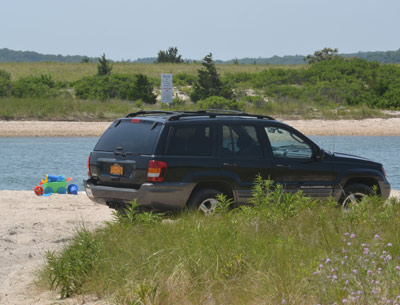No to Ban On Beach Driving

Beach driving, the East Hampton Town Trustees told the East Hampton Town Board on Tuesday in no uncertain terms, is in the trustees’ jurisdiction, and, on bay beaches where it is now allowed, it will continue. The board’s talk of curtailing beach driving at a July 10 meeting in Montauk, following complaints about vehicles clogging some beaches, alarmed the trustees as well as members of the Montauk Surfcasting Association, who also attended Tuesday’s meeting. Stephanie Forsberg, the trustees’ assistant clerk, said the ancient body “hope the board will honor the trustees’ jurisdiction . . .” and not incur the cost to taxpayers of litigation. Jay Blatt, representing the surfcasters, said that 30 to 40 members of the group regularly drive onto the beach to fish at the Three Mile Harbor channel at Maidstone Park in Springs, an area that was cited as a problem by those concerned about the number of vehicles there. “We know what this is about,” Mr. Blatt said. “They don’t want to see trucks on the beach. Ninety-nine percent of the time, that’s what this is about.” Some members of Citizens for Access Rights, the beach-driving advocacy group, were also in attendance on Tuesday. The town trustees and the town board are fighting a lawsuit by homeowners prompted by cars and trucks driving along a stretch of ocean beach on Napeague; that suit turns on ownership of a stretch of beach. “Personally, I think it’s time for balancing better,” said Councilwoman Theresa Quigley. “Unlimited access for every user group at every time doesn’t work on certain beaches.” However, she said, it was an “error” for the town board to take up “a trustee issue.” Councilman Peter Van Scoyoc wondered whether “we have gotten to the point in time where we need to look closely to see if additional regulations need to be put in place.” The complaints about Maidstone, he said, were about the number of vehicles on the inlet beach “during peak bathing hours, [so] that it was detracting from the overall enjoyment of that beach.” “We are at a point,” Mr. Van Scoyoc said, “when every summer we have more and more people. They overwhelm some places.” “People who fish . . . the people I know are saying that the board right now is trying to fix something that isn’t broke,” Mr. Blatt said. “Where’s the problem?” He said there had been no problems or accidents. “There’s still a question, is a particular spot so sensitive . . . that it has nothing to do with driving on the beach,” Supervisor Bill Wilkinson said, adding, as he has before, that he himself is a habitual beach driver and fisherman. But, he said, there are some places that it’s unnecessary to drive, unless one is handicapped. “The Maidstone thing is not beach driving,” he had said on July 10. “It’s beach parking.” “At what point does a beach become so crowded with vehicles that people can’t enjoy it anymore?” was Mr. Van Scoyoc’s question. The trustees, Ms. McNally said Tuesday, “support residents’ privilege to access this beach, including vehicular access.” She noted that the trustees spent $102,000 on dredging the channel there, and used the sand to build up the beach. Because of the compact nature of the sand, she said, it is one of the few places where people in a wheelchair or using walkers can get out of cars and move across the sand. “As with other non-bathing beaches, some people choose to use this beach,” she said. “For those who do not want to share the beach with vehicles, we encourage the use of many designated areas where vehicles are not allowed during certain hours during the day.” Ed Michels, the head of Harbor Patrol, said at the Montauk meeting that certain beaches, such as a stretch along the bay at the end of Flaggy Hole Road in Springs, where beach driving has prompted complaints, do not have lifeguards and are not designated bathing beaches, though people do swim and sun there. Technically, he said, officers could ticket swimmers there. Board members blanched at that prospect. Debra Foster, a former town councilwoman who attended Tuesday’s meeting, pointed to the beach-use issue as one of a number that should be further examined, and repeated her call to the board to hold a public forum on planning topics. “We have a beautiful place at the tip of an island only 90 miles from the biggest metropolitan area, maybe, in the world,” she said, “and we have a balance problem, a space problem.” “Some decisions are going to have to be made,” she continued. “Everybody who wants to be here and do what they want to do when they want to do it. . . . You have a responsibility to represent us and our health, safety, and welfare.” She called for a long-range planning forum as a good way for officials to hear from the people. “You’ve done it with sensitive topics, and you’ve done it well,” she told the board, referring to forums in the last several years on deer management, septic waste issues, and the economy. “I think we’re ready for this conversation,” Ms. Foster said, “rather than having these bursts of staccato concerns about what is generically a sustainability problem.”
